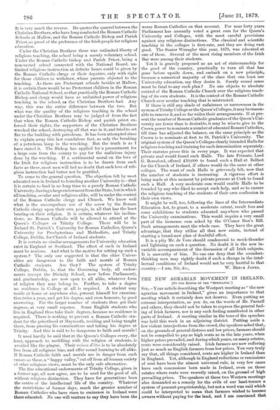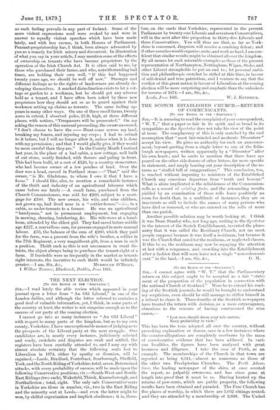THE NEW AGRARIAN MOVEMENT IN IRELAND. .
!TO THE EDITOR OF THE "SPECTATOR."]
Stn,—Your article describing the Westport meeting as " the new' agrarian movement in Ireland," gives an importance to that meeting which it certainly does not deserve. Even putting an extreme interpretation, as you do, on the words of Mr. Parnell and others, they should not be taken to express the general feel- ing of Irish farmers, nor is any such feeling manifested in other parts of Ireland. A meeting similar in the tone of the speeches was held this week in an adjoining district. Putting aside a few violent interjections from the crowd, the speakers asked that,. on the grounds of general distress and low prices, farmers should not be compelled to pay as high rents as in the late years, when higher prices prevailed, and during which years, on many estates,. rents were considerably raised. Irish farmers are now suffering just as much as English farmers from low prices. You very truly say that, all things considered, rents are higher in Ireland than in England. Yet, although in England reductions or remissions of rent have been the almost universal rule, in very few cases have such concessions been made in Ireland, even on those estates where rents were recently raised, on the ground of high prevailing prices. The speakers at these two Western meetings also demanded as a remedy for the evils of our land-tenure system of peasant-proprietorship, but not a word was said which could be interpreted to mean that farmers wished to become owners without paying for the land, and I am convinced that
no such feeling prevails in any part of Ireland. Some of the more violent expressions used were evoked by and were in answer to equally violent speeches which have been made lately, and with less excuse, in both Houses of Parliament. Peasant-proprietorship bas, I think, been always advocated by you as a remedy for Irish misery and discontent. In illustration of what you say in your article, I may mention some of the effects of ownership on tenants who have become proprietors by the operation of the Irish Church Act. It is often said to me, by those who purchased their farms, and who, notwithstanding bad times, are holding their own well, " If this had happened twenty years ago, we should be well off now." Stronger and different feelings as to the rights of landowners are already de- veloping themselves. A marked disinclination exists to let a cot- tage or garden to a workman, lest he should get any adverse hold as a tenant, and I have often been asked by these new proprietors how they should act so as to guard against their workmen setting up claims as tenants. The same feeling ap- pears in many other ways. On one of these small farms, twenty acres in extent, I observed poles, 25 ft. high, at three different places, with notices, "Trespassers will be prosecuted." On my asking the reason of this unusual proceeding, the owner answered, "I don't choose to have the — Hunt come across my land, breaking my fences, and injuring my crops ; I had to submit to it before, but I will no longer allow it, unless when it is done with my permission ; and that I would gladly give, if they would be more careful than they are." In the County Meath I noticed last year, in the place of a bad cabin, a new cottage, well built of cut stone, neatly finished, with flowers and paling in front. This had been built, at a cost of £120, by a country stonecutter, who had become owner of a few perches of land. Over the door was a head, carved in Portland stone :—" That," said the owner, "is Mr. Gladstone, to whom I owe it that I have a home." I should like, also, to mention a remarkable instance of the thrift and industry of an agricultural labourer which came before me lately :—A small farm, purchased from the Church Commissioners, was sold for £260, subject to a mort- gage for £160. The new owner, his wife, and nine children, not grown up, had lived near in a " cottier-house,"—i.e., in a cabin, as under-tenants to a farmer. He was an agricultural " handyman," not in permanent employment, but engaging in mowing, shearing, butchering, &c. His wife wove at a hand- loom, attended by the eldest girl. They had saved before middle age £227, a marvellous sum, for persons engaged in mere manual labour. £33, the balance of the sum of £260, which they paid for the farm, was a present from the wife's brother, a soldier in the 77th Regiment, a very magnificent gift, from a man in such a position. Thrift such as this is not uncommon in rural dis- tricts, the object always being to purchase the tenant-right of a farm. If freeholds were as frequently in the market as tenant- right interests, the incentive to such thrift would be infinitely



































 Previous page
Previous page